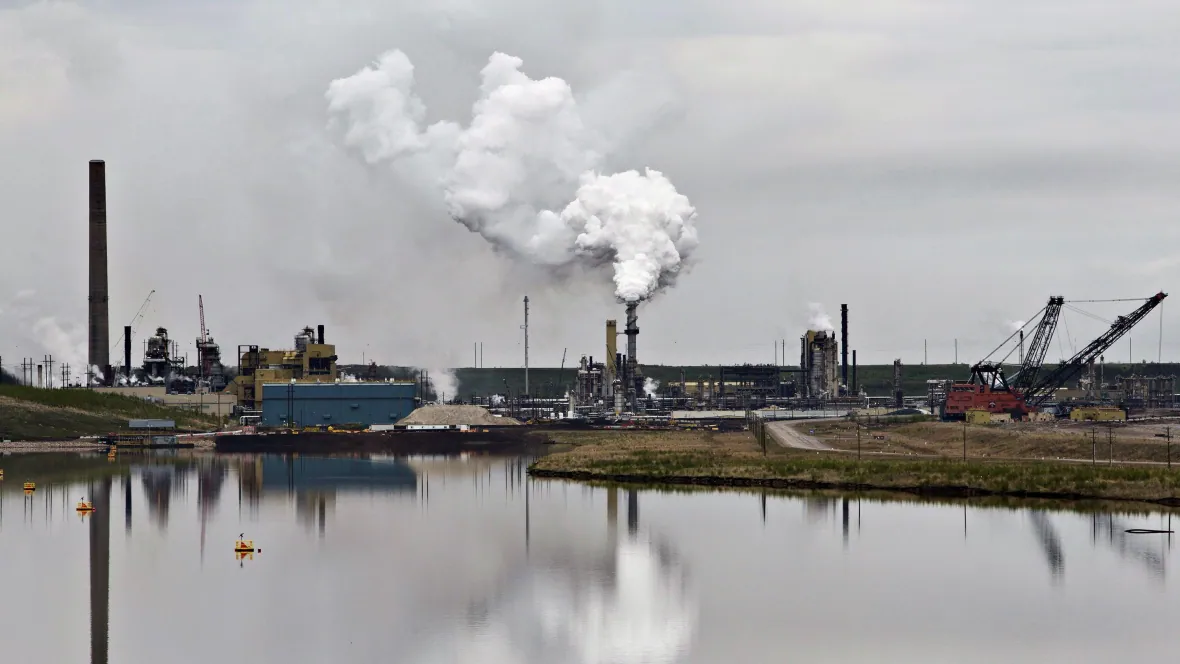
The Alberta government is changing its industrial carbon tax program to let companies avoid paying provincial fees for emissions by investing in their own emissions reduction projects instead.
Premier Danielle Smith told reporters Tuesday that the move, likely to come into effect this fall, would support economic growth while ensuring companies work to lower emissions.
“We’re looking at it a little like a recycling program,” Smith said.
“It will incentivize companies to spend money here in Alberta on emissions reductions investments specific to their projects without burdensome regulation or government choosing winners or losers.”
Smith said the province is also allowing smaller companies that don’t meet the program’s minimum emissions threshold to opt out of the carbon pricing system for 2025.
“This change will help smaller industries to save money and redirect resources into emissions reduction investments or other operational improvements for more cost savings,” she said.
‘Significant win for industry’: environment minister
Alberta has had an industrial carbon pricing system since 2007. The current version, called Technology Innovation and Emissions Reduction (TIER), has been in place since 2020.
Smith said the upcoming changes to the program stem from consultations her government did with hundreds of oilsands and natural gas officials last spring.
Environment Minister Rebecca Schulz, speaking alongside Smith, said the changes are a “significant win for industry.”
“Instead of sticking to two compliance options, which is by paying a levy or using credits to offset their emissions, enabling companies to reinvest in their own facilities and choose the onsite technologies that work best for them, this helps with the economics of production but also emissions reduction,” said Schulz.
Environmental groups raise concerns
Smith’s announcement drew criticism, with groups like clean energy think tank the Pembina Institute, saying the changes could lead to “double-counting,” while also weakening the value of Alberta’s carbon credits.
“Based on what we’ve heard today, companies will be able to avoid paying a compliance cost at the point of investment in technologies, but then also generate a carbon credit when their emissions start to be reduced,” said Chris Severson-Baker, the institute’s executive director.
Dale Beugin, executive vice-president at the Canadian Climate Institute, agreed. He said in a statement that permitting double-counting would create an oversupply of carbon credits in the market.
“Without improvements, excess credit supply — and the low credit prices that result — will dilute incentives for investment,” Beugin said.
“These changes add up to two things: less long-term certainty for businesses and investors, and more harmful emissions going into our atmosphere, contributing to global emissions fuelling more wildfires, droughts and extreme weather endangering Albertan communities.”
Opposition NDP energy critic Nagwan Al-Guneid said the province didn’t do enough consultation before moving forward with the changes.
She also said Smith and Schulz’s announcement lacked specific details on what kind of projects will qualify for companies to invest in under the new rules.
Schulz said Tuesday that companies will have eight years to make infrastructure investments if they choose to comply through the new method.
She said if those investments aren’t made, a company’s emissions fees will be collected by the government as usual.
Kendall Dilling, the president of the Pathways Alliance, said in a statement that the government’s changes will encourage investment in emissions reduction technology.
Dilling said the alliance, which represents Canada’s largest oilsands companies that are working together on a major potential carbon capture and storage project, appreciates the province’s efforts to support the oilsands industry.
Alberta indefinitely froze its industrial carbon price at $95 per tonne of emissions in May, and neither Smith nor Schulz mentioned Tuesday whether that freeze would be lifted in the near future.
Schulz’s office did not immediately respond to questions about the future of the freeze.
Smith said in May that the move was a critical step in keeping industry competitive throughout Canada’s tariff fight with the United States.
Alberta’s price was set to increase to $110 per tonne next year in line with federal rules, and if Alberta doesn’t lift the freeze by the new year, it will mean the province breaks its compliance agreement.
Ottawa could choose to enforce the $110 price if Alberta doesn’t increase its carbon price come January — a move advocacy group Environmental Defence called on Prime Minister Mark Carney to take Tuesday.
“Alberta needs to pull its weight when it comes to fighting climate change and if it won’t, the federal government must step in,” said the group’s programs director, Keith Brooks, in a statement.



